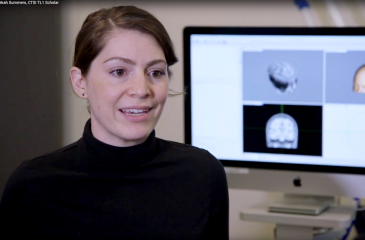When Department of Neurology researcher Rebekah Summers, DPT, PhD, first applied to CTSI’s TL1 Translational Research program for predoctoral students and postdoctoral fellows, she hoped for funding for her postdoctoral research. Now a TL1 Scholar nearing completion of the two-year program, Dr. Summers has found a community of interdisciplinary Scholars interested in translational science and unique support for her career as a clinician researcher.
“When I saw the call for the TL1 Translational Research program, I knew this was something that really fit my needs as a clinician, trained as a physical therapist, and as a scientist who really wants to progress in the field and make an impact,” shared Dr. Summers, in a filmed interview with CTSI.
“The TL1 Translational Research program was extremely attractive to me because it not only provided funding for my post-doc, but it provided career training, the actual tools that I need to succeed as a scientist.”
Dr. Summers’s research focuses on brain degeneration, and identifying the onset of this process through measuring movement, neuroplasticity and brain structure.
“If we could find ways to measure brain degeneration, using some research methods, we might be able to implement treatments earlier, and actually decrease the burden of those conditions over time,” said Dr. Summers.
Dr. Summers’s research is cross-disciplinary, utilizing measurement resources and expertise from across the University, including the Non-invasive Neuromodulation Lab, Center for Magnetic Resonance Research, Department of Radiology and Neurosurgery, Department of Neurology, and the Sleep Health program.
Through the TL1 Translational Research program, Dr. Summers has been able to conduct research with patients, learn brain imaging analysis and related software during training in Croatia, and has received structured mentorship from experienced investigators both in and outside her field of expertise. To get the most out of this valuable experience, she encourages doctoral students and postdoctoral fellows considering applying to the program to think broadly about the skills they need to gain to achieve their long-term career goals and what is needed to move their project forward.
“Really understand where your project fits into this big continuum (of translational science),” she advises. “Where do you see your research having a long-term impact on that continuum? Be able to really develop that narrative of how that story can develop and make an impact on human health.”
Looking ahead, Dr. Summers plans to utilize what she has learned through the TL1 Translational Research program to join a research university as faculty, and aims to run her own laboratory.
Learn more about the TL1 Program and submit Letters of Intent by March 30, 2020 on the program page.
